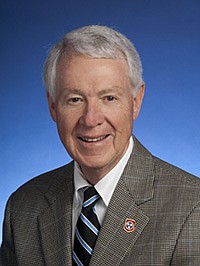NASHVILLE - A prominent business tax attorney on Wednesday filed suit against state Finance and Administration Commissioner Larry Martin, charging his department violated Tennessee's Open Records Act by refusing to provide him detailed information used to develop Gov. Bill Haslam's proposed "Revenue Modernization Act."
In his complaint, attorney Brett Carter is asking a Davidson County Chancery Court to compel the state to disclose withheld records immediately. Both the House and Senate Finance committees are poised to consider the bill next week.
The suit says the refusal and the bureaucratic and legal run-around Martin has gotten constitute a "willful violation of the Open Records Act."
Moreover, Carter says, Martin has mentioned a "study" was done on the business tax issue that undergirds the administration's changes in state law.
"[W]thout providing such support" including the study, the complaint says, "the representations of the department do not provide a sufficient basis for the General Assembly to evaluate and conclude whether modifications to the Tennessee tax code are necessary or appropriate."
Carter, co-chair of the state and local tax practice group at the Bradley Arant Boult Cummings law firm, says in the action that he is seeking to delve into a legislative proposal that would increase state revenues from business taxes by more than $60 million over the next two fiscal years.
That's based on a legislative fiscal note. The administration has only said publicly it would generate $14 million in new revenue for the upcoming 2015-2016 tax year starting July 1.
Asked for comment, Lola Potter, a Martin spokeswoman, told the Times Free Press that "due to pending litigation, it wouldn't be appropriate to comment at this time."
Carter says his original request was filed Feb. 13.
Tennessee's Open Records Act states that "all state, county and municipal records shall, at all times during business hours, which for public hospitals be open for personal inspection by any citizen of this state, and those in charge of the records shall not refuse such right of inspection to any citizen, unless otherwise provided by state law."
The bill was announced by Republican Haslam in his Feb. 9 State of the State address. The governor said it's intended to address problems in business franchise and excise taxes which have yo-yo'd up and down in recent years.
It also creates a "level playing field" between in-state and out-of-state companies, the governor said.
Carter's complaint says that in Martin's Feb. 10 testimony before the Senate Finance Committee, the commissioner "indicated that Dr. Bill Fox of the University of Tennessee, and a 'nationally recognized law firm,' along with with Department of Revenue participated in the study.
"Commissioner Martin," the filing continues, "indicated that the tax study led the Department, in conjuction with the Department of Revenue, to develop tax legislation that would be presented by the Administration as part of the budget process."
So, Carter says, he made the state Open Records Act request by mail to Martin. In it, he sought the tax study and all documents, email and other records pertaining to the study. The suit says Martin had indicated the state spent $350,000 on it.
Two weeks later, the suit says, the department claimed it never received Carter's request. After he refiled it, the department's general counsel, Martha Nichols, on March 3 sought clarification. On March 10, Carter said he was told it would take another two weeks and an "indeterminate amount of time to evaluate legal confidentiality considerations."
So he split his request into two parts, asking for the study first. A week later, Nichols responded, "indicating there him there was not a 'Tax Analysis Study' report or single document that was produced by the study initiative."
There were some limited documents available that apparently are part of public presentations. It included a presentation, a history of past taxes and the bios of law firm members.
But Carter was told most information was "tax administrative information made confidential by law," the complaint continues.
The tax administration exemption claim is unfounded, the suit says because there's nothing being administered. It's a bill under consideration.
"The tax study was the basis for drafting the Revenue Modernization Act," the complaint states. "Thus, the study did not involve any administration."
